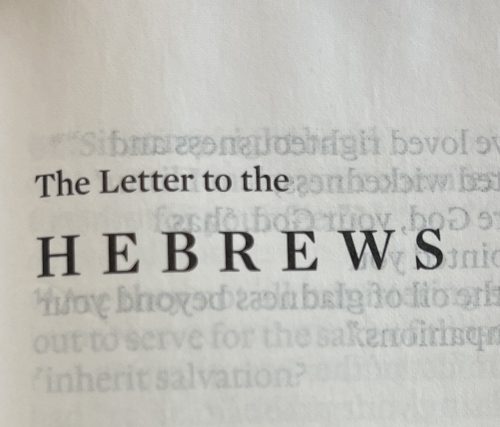Learn to See Past the Pain
God uses “localized” suffering to deliver us from “distant” maladies. Although the “localized” pain captures our attention, it’s the “distant” issue God is working on.
How to Approach Holy Scripture
The great error humanists make is interpreting Holy Scripture through a human lens (e.g., a lens even an unbeliever might use to interpret the Bible). The correct starting point must always be God’s sovereign, holy decree (e.g. a lens only a believer can learn and gain proper perspective on).
What is Good? And Who Gets to Define It?
Nov 9, 2017 – Part 1
Pastor Mark Dever
God defines what is good. Goodness or righteousness is not an external standard that God effortlessly and perfectly conforms to; rather, goodness is a way of describing God and all his actions and commands.
Ro 8:28
And we know that for those who love God all things work together for good, for those who are called according to his purpose.
The Purpose, Plan and Genre of Hebrews
The overarching theme of the Book of Hebrews is parenetic (persuasive). Biblical and theological exposition was subordinate to the writer’s parenetical “word of exhortation”, which was meant to induce an emotional response. It is a homily (sermon), laced with rhetorical language, from a shepherd to a group of well-known sheep for the sake of encouragement. (Heb 13:22; 1:1-4; 1:5-4:16; 5-6; 7:1-10:18; 10:19-13:25)
The Rhetoric in Hebrews
- Prologue: v1:1-4
- Thematic Statement: v1:5-4:16
- Statement of Plausibility: ch5-6
- Demonstration of Proof: v7:1-10:18
- Closing Inspiration: v10:19-13:25
Then Job answered the LORD and said: “I know that you can do all things, and that no purpose of yours can be thwarted. ‘Who is this that hides counsel without knowledge?’ Therefore I have uttered what I did not understand, things too wonderful for me, which I did not know.”
The Rhetoric in Hebrews
- Prologue: v1:1-4
- Thematic Statement: v1:5-4:16
- Statement of Plausibility: ch5-6
- Demonstration of Proof: v7:1-10:18
- Closing Inspiration: v10:19-13:25
